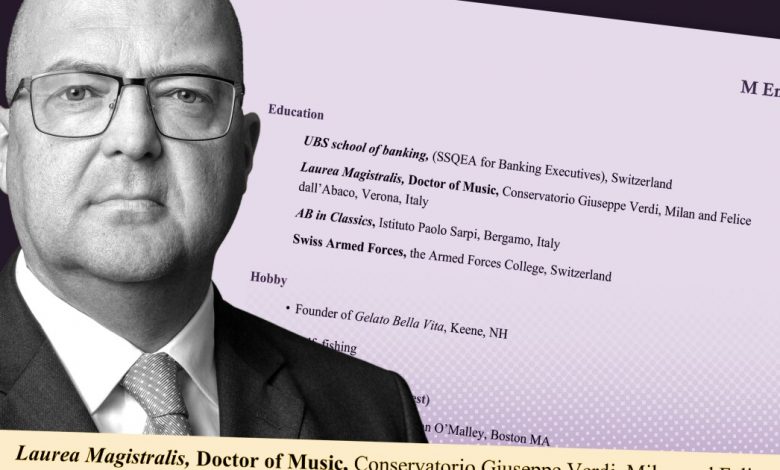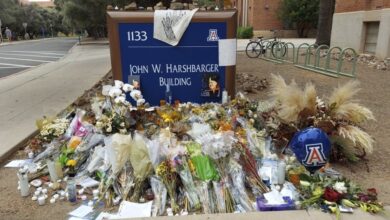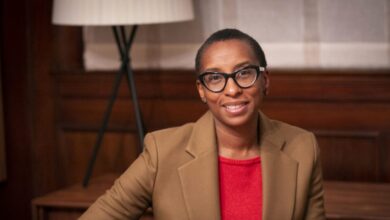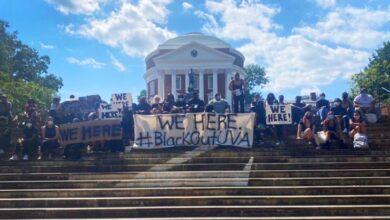A Catholic University Hired a Dean With Ties to the Vatican. The Problem? He Faked His Credentials.

[ad_1]
The University of St. Thomas, in Houston, is reviewing its hiring processes after faculty members accused its business-school dean of lying about his credentials.
Mario Enzler, who was hired as dean of the Cameron School of Business in 2020, resigned this month.
“Over the summer, the University conducted a review of his credentials, and gave him an opportunity to refute the findings,” the university’s president, Richard L. Ludwick, wrote in a campuswide email on Friday. “Instead, he chose to resign.” The university has hired a consultant to support the business school as it embarks on a national search for a new dean, the president wrote in the email.
The university’s vice president of academic affairs, Christopher P. Evans, has been placed on administrative leave. Faculty members have accused Evans of hiring Enzler even though he lacked the required academic qualifications.
Some are seeking termination and legal repercussions for Enzler and Evans, who they allege violated the Texas penal code and the policies of the university’s accreditor, the Southern Association of Colleges and Schools Commission on Colleges.
A university representative declined to comment further on what went wrong when Enzler was hired, but there are several indications that the hiring process did not follow industry standards.
For one, the university’s search firm was told not to conduct reference and background checks on Enzler.
Lori Werth, a board member of the Association of Chief Academic Officers and provost at the University of Pikeville, said that all new hires should have their credentials verified before they start a job, which includes academic transcripts from all institutions they’ve attended.
“We sometimes call people who’re not on their reference list,” Werth said.
It’s unclear whether St. Thomas administrators contacted Enzler’s references, which included five high-ranking clergy who were cardinals, archbishops, and bishops, along with two businessmen who are not academics, according to his CV. St. Thomas is a Catholic university.
Enzler’s CV
But it is clear that the university officials did not verify Enzler’s academic credentials before he was hired, or if they did, they decided to hire him even though the credentials did not check out.
Under the education section of Enzler’s CV, five institutions are listed. No dates are included.
Leonard Cassuto, a professor at Fordham University and co-author of The New PhD: How to Build a Better Graduate Education, reviewed Enzler’s CV, which he called “a series of items without any explanation.” The convention requires bullet points that describe each role.
Cassuto added that U.S. hiring committees might’ve approached Enzler’s CV with caution because of the evident cultural differences. “But if he was American, they would think: Did he ever apply for a job before?”
The American hiring administrators “might have relaxed the level of scrutiny. It doesn’t answer the question of why you hired a musician to be the business-school dean,” he said.
Despite Enzler’s repeated claims that he held a doctoral degree in music — and he once publicly claimed to hold a doctorate in finance — none of the institutions on his CV offer doctorate-level programs.
Some of the CV’s claims about Enzler’s education check out: While The Chronicle was unable to reach the Swiss Armed Forces College, which Enzler claims he attended, pictures from his time as a Swiss Guard to Pope John Paul II are available online and suggest that he was trained with the Swiss Armed Forces. Such training, however, is strictly military focused and unrelated to business.
Other claims should have raised questions. His CV lists another institution based in Switzerland, “UBS School of Banking.” UBS is not a school, but rather a wealth-management firm where Enzler claims to have worked from 1993 to 2009. Representatives from UBS were not available for comment.
Enzler, who was born in Italy, also listed three credentials from Italian institutions. His “AB in Classics” would seem to indicate he holds a bachelor of arts degree from Instituto Paolo Sarpi in Bergamo, Italy, but that institution is a high school and does not offer university-level programs of study.
Enzler claims to have obtained a “Laurea Magistralis, Doctor of Music” degree from two other Italian institutions, both of which are music conservatories that confirmed Enzler attended. But at the time Enzler was there, in the 1980s, a credential from an Italian conservatory was not equivalent to an academic college degree. Rather than pursuing a liberal-arts curriculum in addition to music training, his degree indicates he spent most of his time studying the trumpet.
Eugenio Refini, an associate professor of Italian at New York University, who was born and raised in Italy, explained a 2010 reform in the Italian education system may have helped Enzler create the impression that he held a doctorate. After the reform, conservatories added classes and requirements that allowed them to award academic degrees.
“A music diploma from 1988, it would make you a great musician, but it was not the same as going to college,” Refini said.
Cultural Differences
A cultural difference may have contributed to the confusion, too. Although in the United States only those who have earned doctorates are called “doctor,” the Italian system functions differently. “Once you get a degree from university, you get the title of doctor,” Refini said. “But when you read it in English, it’s very misleading.”
“It’s a little bit of a stretch in the sense that people who would have a music diploma from the old system would never call themselves doctor. They would be called maestros or professors if they were teaching,” Refini said.
During his time at St. Thomas, Enzler was often referred to as “Dr.” and had “Ph.D.” alongside his name. During the university’s 2022 commencement ceremony, Enzler was introduced as “Dr.” and wore a black velvet tam with a gold tassel, traditionally reserved for those who hold doctorate degrees. The ceremony was held in May, about a month after business-school faculty members sent a letter to the university administration pointing out that Enzler had misrepresented his educational background.
He has also been referred to as “Dr.” and described as having a Ph.D. by multiple Catholic online publications and the Houston Business Journal.
In March 2022, during a luncheon put on by the organization Catholic Citizens of Illinois, Enzler publicly stated that he has a doctorate in finance. A doctorate in finance is not mentioned in his CV or in any biography reviewed by The Chronicle.
Laura Banella, an assistant professor of Italian at Notre Dame University who was born and raised in Italy, does not think the discrepancy was a simple misunderstanding.
“If someone who didn’t speak much English made this mistake when translating from Italian, I would understand. But someone in the academic context, who lives in the U.S., they should know. These are really big mistakes,” she said.
Banella had to go through an evaluation of all her degrees when applying to a Ph.D. program in the United States and later to an academic job. “I had to provide official translations. It was a long process to prove my Italian credentials,” she said.
Foreign diplomas are usually evaluated by a third-party company that specializes in degree equivalency, like the Foundation for International Services.
Severine Kassimou, director of evaluations at the foundation, told The Chronicle that a proper degree evaluation cannot rely on a CV. “We need to see the official credentials and certified translations,” she said. The official credentials usually include the final diploma and transcript for a course-by-course evaluation.
Evaluation agencies should be certified by the National Association of Credential Evaluation Services (NACES), Kassimou said. They evaluate the duration of the academic program, the admissions requirements, the institution’s accreditation, and whether it’s recognized by the country’s department of education.
When they detect degree forgery, agencies contact all NACES agencies to alert them in case the individual tries to get equivalency from a different agency. They also notify the institution that required the evaluation.
The University of St. Thomas declined to answer questions about whether it pursued any kind of vetting of Enzler’s credentials.
Roderick J. McDavis, managing principal at ABG Search, said that at the dean, provost, and president level, it’s unusual to encounter candidates misleading or falsifying credentials. “A dean would’ve been a faculty member somewhere else, and the previous university already checked their degrees. But we still verify to ensure we have done our due diligence,” he said.
Prior to being hired by St. Thomas, Enzler worked as a faculty member at Catholic University’s Busch School of Business. He taught undergraduate- and graduate-level financial-management courses.
But in the eyes of some faculty members, Enzler shouldn’t have been hired in the first place. From the very beginning, St. Thomas administrators knew that Enzler didn’t have a terminal degree in business. He taught business courses that accreditor policies allow only those with business degrees to teach.
Faculty members took matters into their own hands to investigate Enzler’s qualifications and alert the university of their findings. Allegations that he would not supply accreditation documents were documented in a grievance submitted to the university in May.
“What took [St. Thomas] four months to act?” said Ramon Fernandez, an assistant professor of accounting. “Going public was the last resort. But going public will prevent Enzler from perpetrating this fraud on another school.”
[ad_2]
Source link






